Analysis and Assessment of Emotional Intelligence
VerifiedAdded on 2023/06/12
|13
|3485
|193
AI Summary
This article discusses the assessment of emotional intelligence, cultural dimensions, personality traits, Belbin team roles, communication skills, and reliability as a leader. It explains how these factors are essential for effective teamwork and successful project completion.
Contribute Materials
Your contribution can guide someone’s learning journey. Share your
documents today.
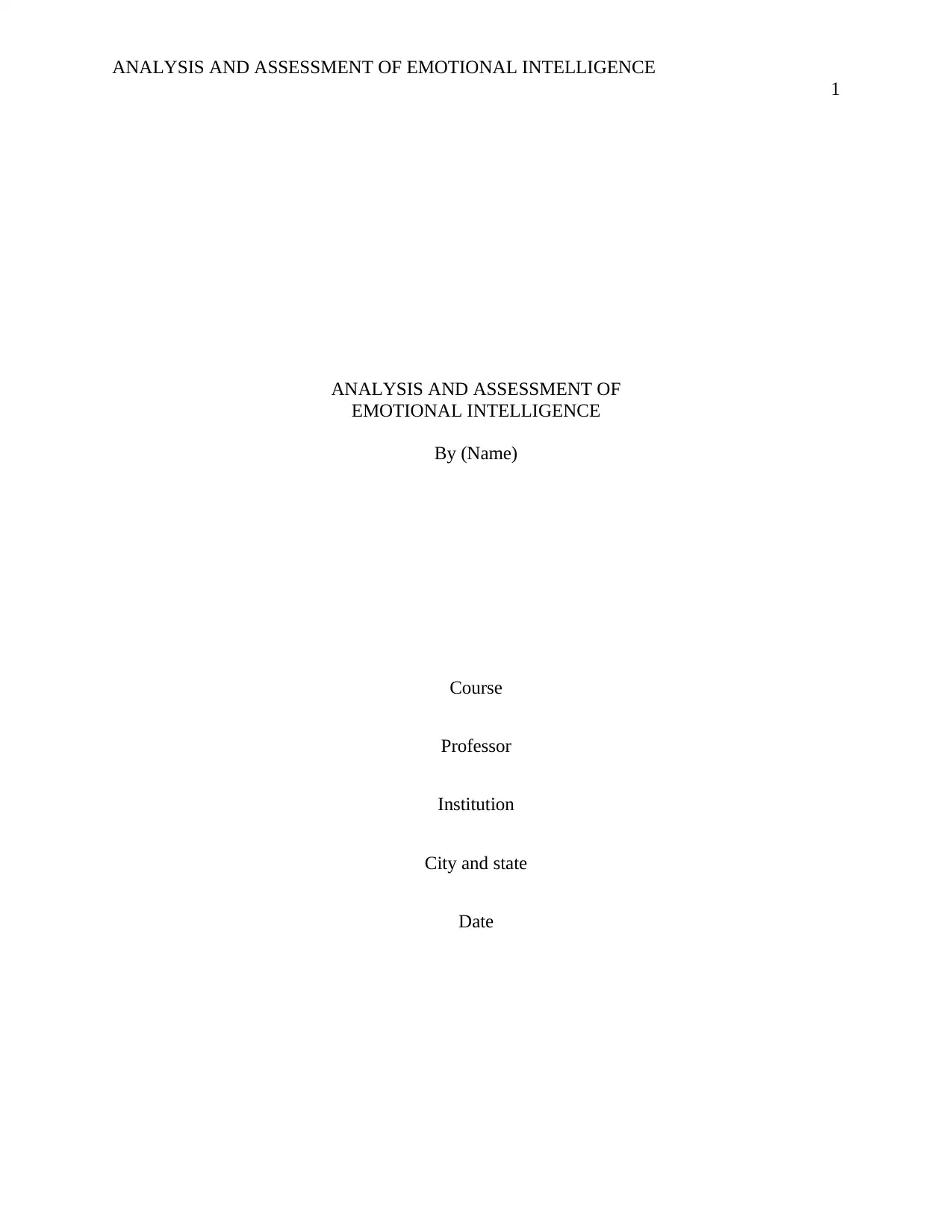
ANALYSIS AND ASSESSMENT OF EMOTIONAL INTELLIGENCE
1
ANALYSIS AND ASSESSMENT OF
EMOTIONAL INTELLIGENCE
By (Name)
Course
Professor
Institution
City and state
Date
1
ANALYSIS AND ASSESSMENT OF
EMOTIONAL INTELLIGENCE
By (Name)
Course
Professor
Institution
City and state
Date
Secure Best Marks with AI Grader
Need help grading? Try our AI Grader for instant feedback on your assignments.
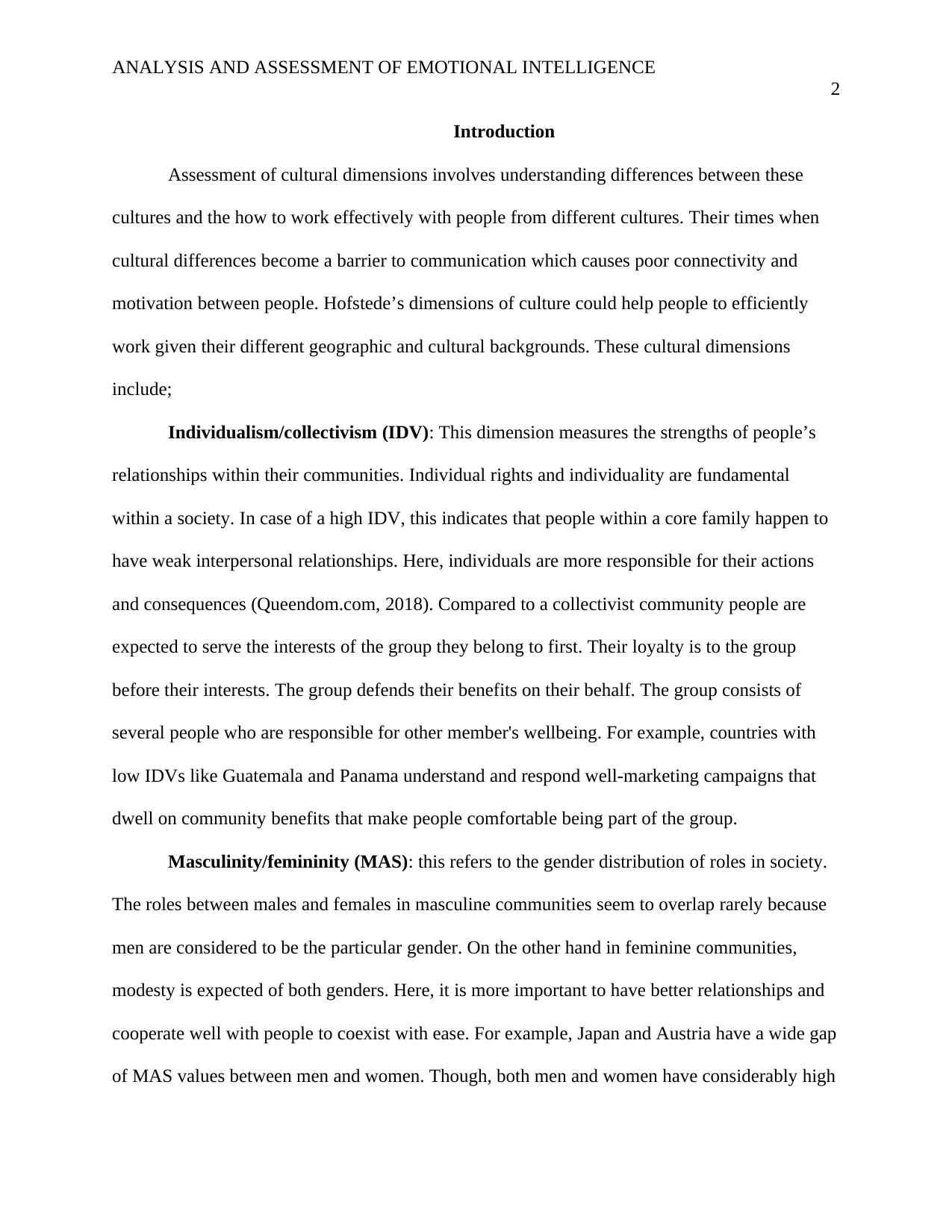
ANALYSIS AND ASSESSMENT OF EMOTIONAL INTELLIGENCE
2
Introduction
Assessment of cultural dimensions involves understanding differences between these
cultures and the how to work effectively with people from different cultures. Their times when
cultural differences become a barrier to communication which causes poor connectivity and
motivation between people. Hofstede’s dimensions of culture could help people to efficiently
work given their different geographic and cultural backgrounds. These cultural dimensions
include;
Individualism/collectivism (IDV): This dimension measures the strengths of people’s
relationships within their communities. Individual rights and individuality are fundamental
within a society. In case of a high IDV, this indicates that people within a core family happen to
have weak interpersonal relationships. Here, individuals are more responsible for their actions
and consequences (Queendom.com, 2018). Compared to a collectivist community people are
expected to serve the interests of the group they belong to first. Their loyalty is to the group
before their interests. The group defends their benefits on their behalf. The group consists of
several people who are responsible for other member's wellbeing. For example, countries with
low IDVs like Guatemala and Panama understand and respond well-marketing campaigns that
dwell on community benefits that make people comfortable being part of the group.
Masculinity/femininity (MAS): this refers to the gender distribution of roles in society.
The roles between males and females in masculine communities seem to overlap rarely because
men are considered to be the particular gender. On the other hand in feminine communities,
modesty is expected of both genders. Here, it is more important to have better relationships and
cooperate well with people to coexist with ease. For example, Japan and Austria have a wide gap
of MAS values between men and women. Though, both men and women have considerably high
2
Introduction
Assessment of cultural dimensions involves understanding differences between these
cultures and the how to work effectively with people from different cultures. Their times when
cultural differences become a barrier to communication which causes poor connectivity and
motivation between people. Hofstede’s dimensions of culture could help people to efficiently
work given their different geographic and cultural backgrounds. These cultural dimensions
include;
Individualism/collectivism (IDV): This dimension measures the strengths of people’s
relationships within their communities. Individual rights and individuality are fundamental
within a society. In case of a high IDV, this indicates that people within a core family happen to
have weak interpersonal relationships. Here, individuals are more responsible for their actions
and consequences (Queendom.com, 2018). Compared to a collectivist community people are
expected to serve the interests of the group they belong to first. Their loyalty is to the group
before their interests. The group defends their benefits on their behalf. The group consists of
several people who are responsible for other member's wellbeing. For example, countries with
low IDVs like Guatemala and Panama understand and respond well-marketing campaigns that
dwell on community benefits that make people comfortable being part of the group.
Masculinity/femininity (MAS): this refers to the gender distribution of roles in society.
The roles between males and females in masculine communities seem to overlap rarely because
men are considered to be the particular gender. On the other hand in feminine communities,
modesty is expected of both genders. Here, it is more important to have better relationships and
cooperate well with people to coexist with ease. For example, Japan and Austria have a wide gap
of MAS values between men and women. Though, both men and women have considerably high
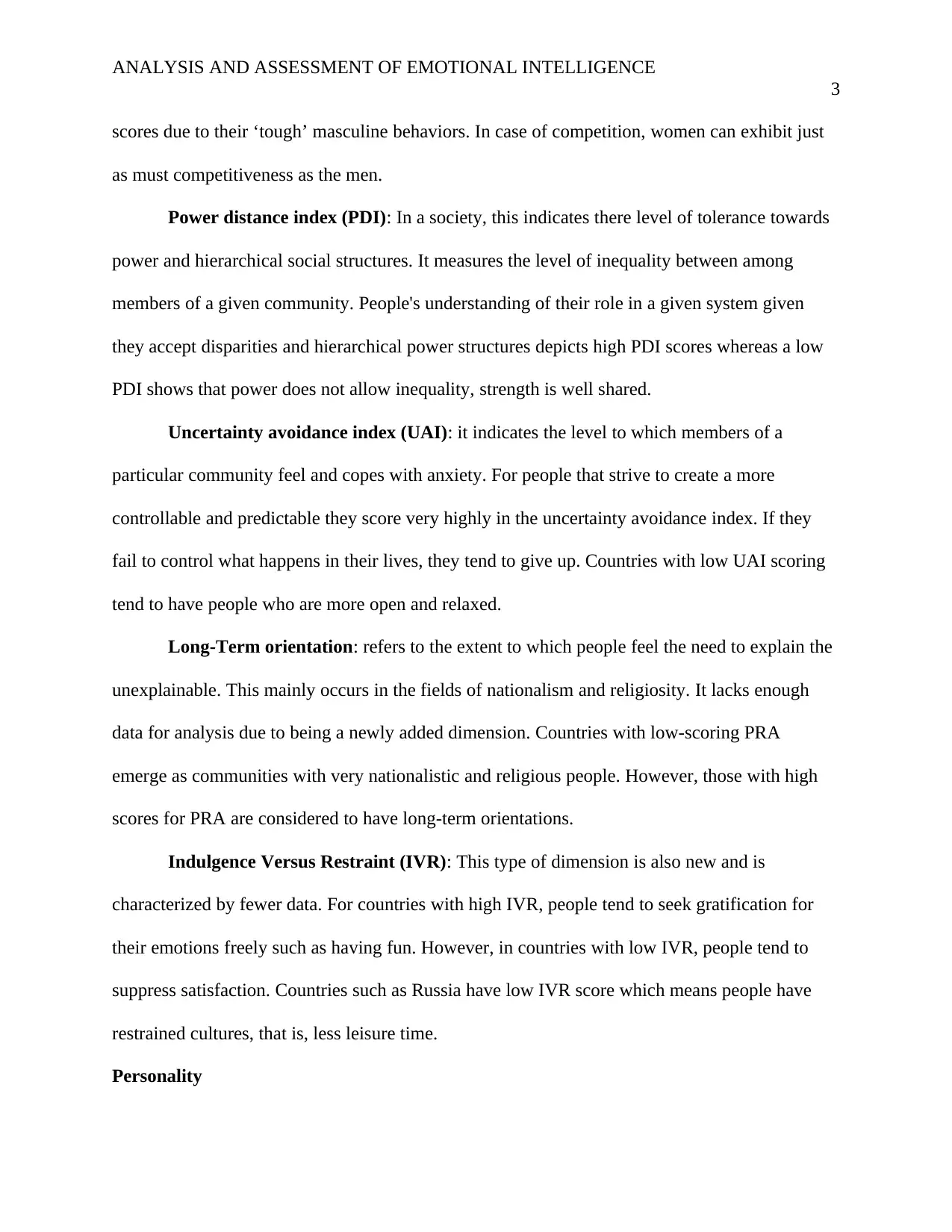
ANALYSIS AND ASSESSMENT OF EMOTIONAL INTELLIGENCE
3
scores due to their ‘tough’ masculine behaviors. In case of competition, women can exhibit just
as must competitiveness as the men.
Power distance index (PDI): In a society, this indicates there level of tolerance towards
power and hierarchical social structures. It measures the level of inequality between among
members of a given community. People's understanding of their role in a given system given
they accept disparities and hierarchical power structures depicts high PDI scores whereas a low
PDI shows that power does not allow inequality, strength is well shared.
Uncertainty avoidance index (UAI): it indicates the level to which members of a
particular community feel and copes with anxiety. For people that strive to create a more
controllable and predictable they score very highly in the uncertainty avoidance index. If they
fail to control what happens in their lives, they tend to give up. Countries with low UAI scoring
tend to have people who are more open and relaxed.
Long-Term orientation: refers to the extent to which people feel the need to explain the
unexplainable. This mainly occurs in the fields of nationalism and religiosity. It lacks enough
data for analysis due to being a newly added dimension. Countries with low-scoring PRA
emerge as communities with very nationalistic and religious people. However, those with high
scores for PRA are considered to have long-term orientations.
Indulgence Versus Restraint (IVR): This type of dimension is also new and is
characterized by fewer data. For countries with high IVR, people tend to seek gratification for
their emotions freely such as having fun. However, in countries with low IVR, people tend to
suppress satisfaction. Countries such as Russia have low IVR score which means people have
restrained cultures, that is, less leisure time.
Personality
3
scores due to their ‘tough’ masculine behaviors. In case of competition, women can exhibit just
as must competitiveness as the men.
Power distance index (PDI): In a society, this indicates there level of tolerance towards
power and hierarchical social structures. It measures the level of inequality between among
members of a given community. People's understanding of their role in a given system given
they accept disparities and hierarchical power structures depicts high PDI scores whereas a low
PDI shows that power does not allow inequality, strength is well shared.
Uncertainty avoidance index (UAI): it indicates the level to which members of a
particular community feel and copes with anxiety. For people that strive to create a more
controllable and predictable they score very highly in the uncertainty avoidance index. If they
fail to control what happens in their lives, they tend to give up. Countries with low UAI scoring
tend to have people who are more open and relaxed.
Long-Term orientation: refers to the extent to which people feel the need to explain the
unexplainable. This mainly occurs in the fields of nationalism and religiosity. It lacks enough
data for analysis due to being a newly added dimension. Countries with low-scoring PRA
emerge as communities with very nationalistic and religious people. However, those with high
scores for PRA are considered to have long-term orientations.
Indulgence Versus Restraint (IVR): This type of dimension is also new and is
characterized by fewer data. For countries with high IVR, people tend to seek gratification for
their emotions freely such as having fun. However, in countries with low IVR, people tend to
suppress satisfaction. Countries such as Russia have low IVR score which means people have
restrained cultures, that is, less leisure time.
Personality
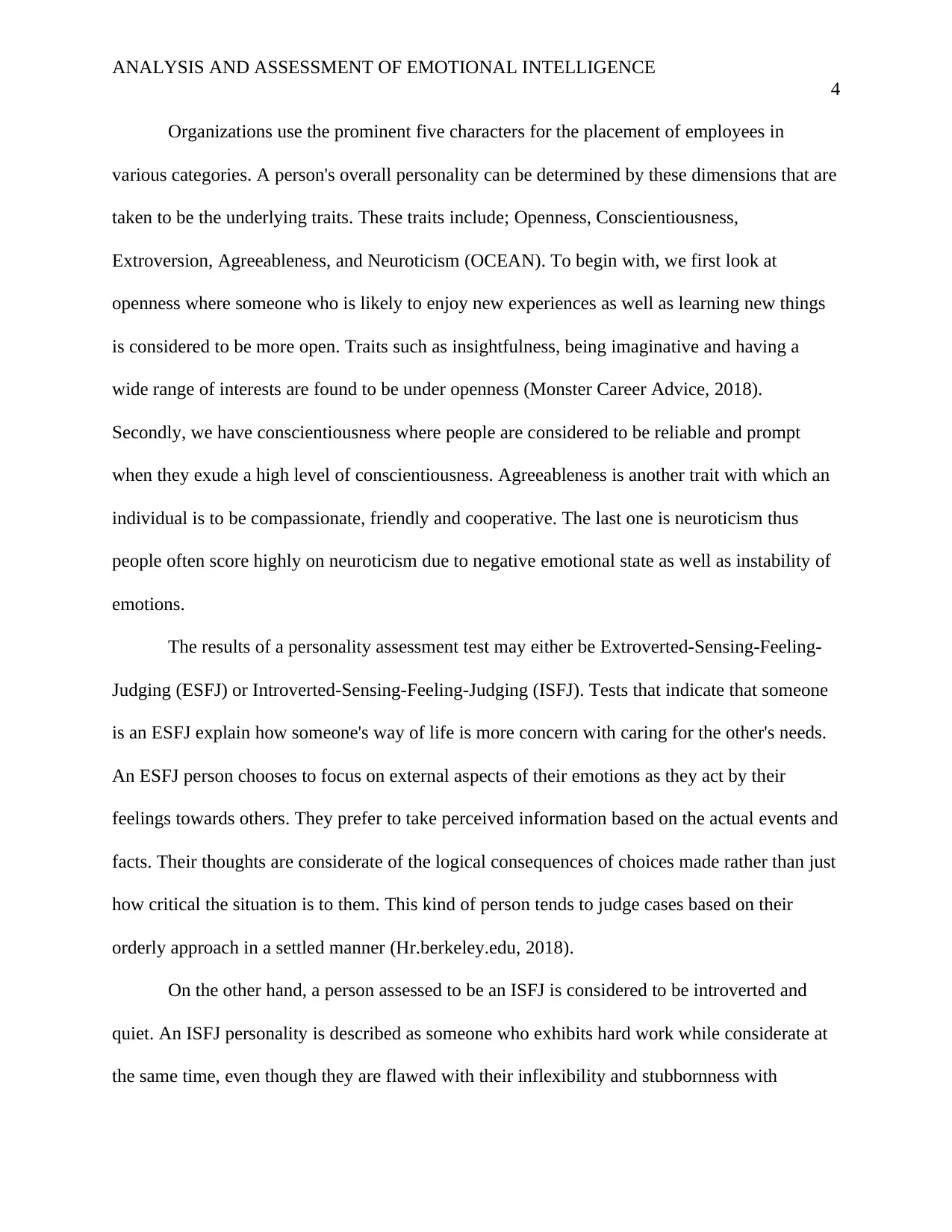
ANALYSIS AND ASSESSMENT OF EMOTIONAL INTELLIGENCE
4
Organizations use the prominent five characters for the placement of employees in
various categories. A person's overall personality can be determined by these dimensions that are
taken to be the underlying traits. These traits include; Openness, Conscientiousness,
Extroversion, Agreeableness, and Neuroticism (OCEAN). To begin with, we first look at
openness where someone who is likely to enjoy new experiences as well as learning new things
is considered to be more open. Traits such as insightfulness, being imaginative and having a
wide range of interests are found to be under openness (Monster Career Advice, 2018).
Secondly, we have conscientiousness where people are considered to be reliable and prompt
when they exude a high level of conscientiousness. Agreeableness is another trait with which an
individual is to be compassionate, friendly and cooperative. The last one is neuroticism thus
people often score highly on neuroticism due to negative emotional state as well as instability of
emotions.
The results of a personality assessment test may either be Extroverted-Sensing-Feeling-
Judging (ESFJ) or Introverted-Sensing-Feeling-Judging (ISFJ). Tests that indicate that someone
is an ESFJ explain how someone's way of life is more concern with caring for the other's needs.
An ESFJ person chooses to focus on external aspects of their emotions as they act by their
feelings towards others. They prefer to take perceived information based on the actual events and
facts. Their thoughts are considerate of the logical consequences of choices made rather than just
how critical the situation is to them. This kind of person tends to judge cases based on their
orderly approach in a settled manner (Hr.berkeley.edu, 2018).
On the other hand, a person assessed to be an ISFJ is considered to be introverted and
quiet. An ISFJ personality is described as someone who exhibits hard work while considerate at
the same time, even though they are flawed with their inflexibility and stubbornness with
4
Organizations use the prominent five characters for the placement of employees in
various categories. A person's overall personality can be determined by these dimensions that are
taken to be the underlying traits. These traits include; Openness, Conscientiousness,
Extroversion, Agreeableness, and Neuroticism (OCEAN). To begin with, we first look at
openness where someone who is likely to enjoy new experiences as well as learning new things
is considered to be more open. Traits such as insightfulness, being imaginative and having a
wide range of interests are found to be under openness (Monster Career Advice, 2018).
Secondly, we have conscientiousness where people are considered to be reliable and prompt
when they exude a high level of conscientiousness. Agreeableness is another trait with which an
individual is to be compassionate, friendly and cooperative. The last one is neuroticism thus
people often score highly on neuroticism due to negative emotional state as well as instability of
emotions.
The results of a personality assessment test may either be Extroverted-Sensing-Feeling-
Judging (ESFJ) or Introverted-Sensing-Feeling-Judging (ISFJ). Tests that indicate that someone
is an ESFJ explain how someone's way of life is more concern with caring for the other's needs.
An ESFJ person chooses to focus on external aspects of their emotions as they act by their
feelings towards others. They prefer to take perceived information based on the actual events and
facts. Their thoughts are considerate of the logical consequences of choices made rather than just
how critical the situation is to them. This kind of person tends to judge cases based on their
orderly approach in a settled manner (Hr.berkeley.edu, 2018).
On the other hand, a person assessed to be an ISFJ is considered to be introverted and
quiet. An ISFJ personality is described as someone who exhibits hard work while considerate at
the same time, even though they are flawed with their inflexibility and stubbornness with
Secure Best Marks with AI Grader
Need help grading? Try our AI Grader for instant feedback on your assignments.
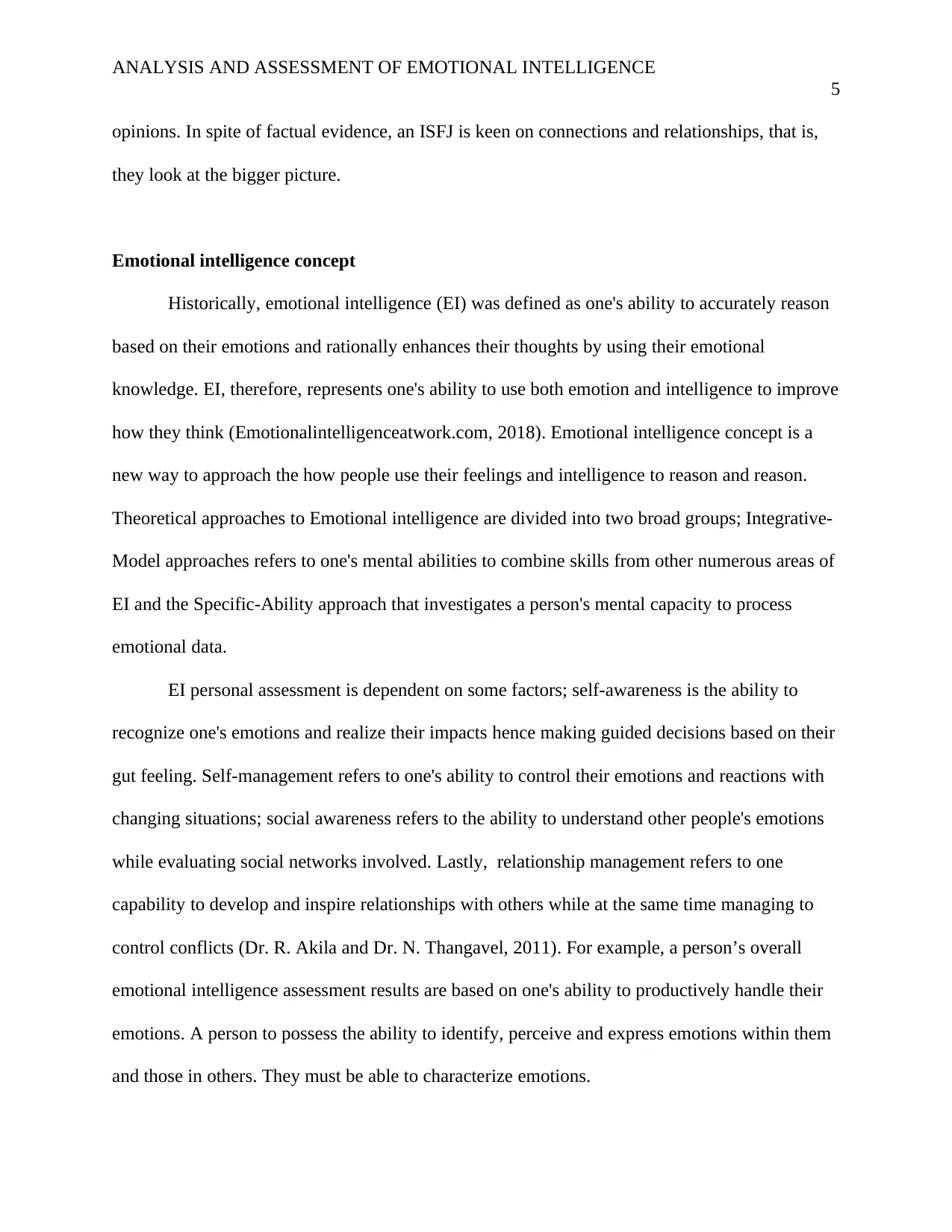
ANALYSIS AND ASSESSMENT OF EMOTIONAL INTELLIGENCE
5
opinions. In spite of factual evidence, an ISFJ is keen on connections and relationships, that is,
they look at the bigger picture.
Emotional intelligence concept
Historically, emotional intelligence (EI) was defined as one's ability to accurately reason
based on their emotions and rationally enhances their thoughts by using their emotional
knowledge. EI, therefore, represents one's ability to use both emotion and intelligence to improve
how they think (Emotionalintelligenceatwork.com, 2018). Emotional intelligence concept is a
new way to approach the how people use their feelings and intelligence to reason and reason.
Theoretical approaches to Emotional intelligence are divided into two broad groups; Integrative-
Model approaches refers to one's mental abilities to combine skills from other numerous areas of
EI and the Specific-Ability approach that investigates a person's mental capacity to process
emotional data.
EI personal assessment is dependent on some factors; self-awareness is the ability to
recognize one's emotions and realize their impacts hence making guided decisions based on their
gut feeling. Self-management refers to one's ability to control their emotions and reactions with
changing situations; social awareness refers to the ability to understand other people's emotions
while evaluating social networks involved. Lastly, relationship management refers to one
capability to develop and inspire relationships with others while at the same time managing to
control conflicts (Dr. R. Akila and Dr. N. Thangavel, 2011). For example, a person’s overall
emotional intelligence assessment results are based on one's ability to productively handle their
emotions. A person to possess the ability to identify, perceive and express emotions within them
and those in others. They must be able to characterize emotions.
5
opinions. In spite of factual evidence, an ISFJ is keen on connections and relationships, that is,
they look at the bigger picture.
Emotional intelligence concept
Historically, emotional intelligence (EI) was defined as one's ability to accurately reason
based on their emotions and rationally enhances their thoughts by using their emotional
knowledge. EI, therefore, represents one's ability to use both emotion and intelligence to improve
how they think (Emotionalintelligenceatwork.com, 2018). Emotional intelligence concept is a
new way to approach the how people use their feelings and intelligence to reason and reason.
Theoretical approaches to Emotional intelligence are divided into two broad groups; Integrative-
Model approaches refers to one's mental abilities to combine skills from other numerous areas of
EI and the Specific-Ability approach that investigates a person's mental capacity to process
emotional data.
EI personal assessment is dependent on some factors; self-awareness is the ability to
recognize one's emotions and realize their impacts hence making guided decisions based on their
gut feeling. Self-management refers to one's ability to control their emotions and reactions with
changing situations; social awareness refers to the ability to understand other people's emotions
while evaluating social networks involved. Lastly, relationship management refers to one
capability to develop and inspire relationships with others while at the same time managing to
control conflicts (Dr. R. Akila and Dr. N. Thangavel, 2011). For example, a person’s overall
emotional intelligence assessment results are based on one's ability to productively handle their
emotions. A person to possess the ability to identify, perceive and express emotions within them
and those in others. They must be able to characterize emotions.
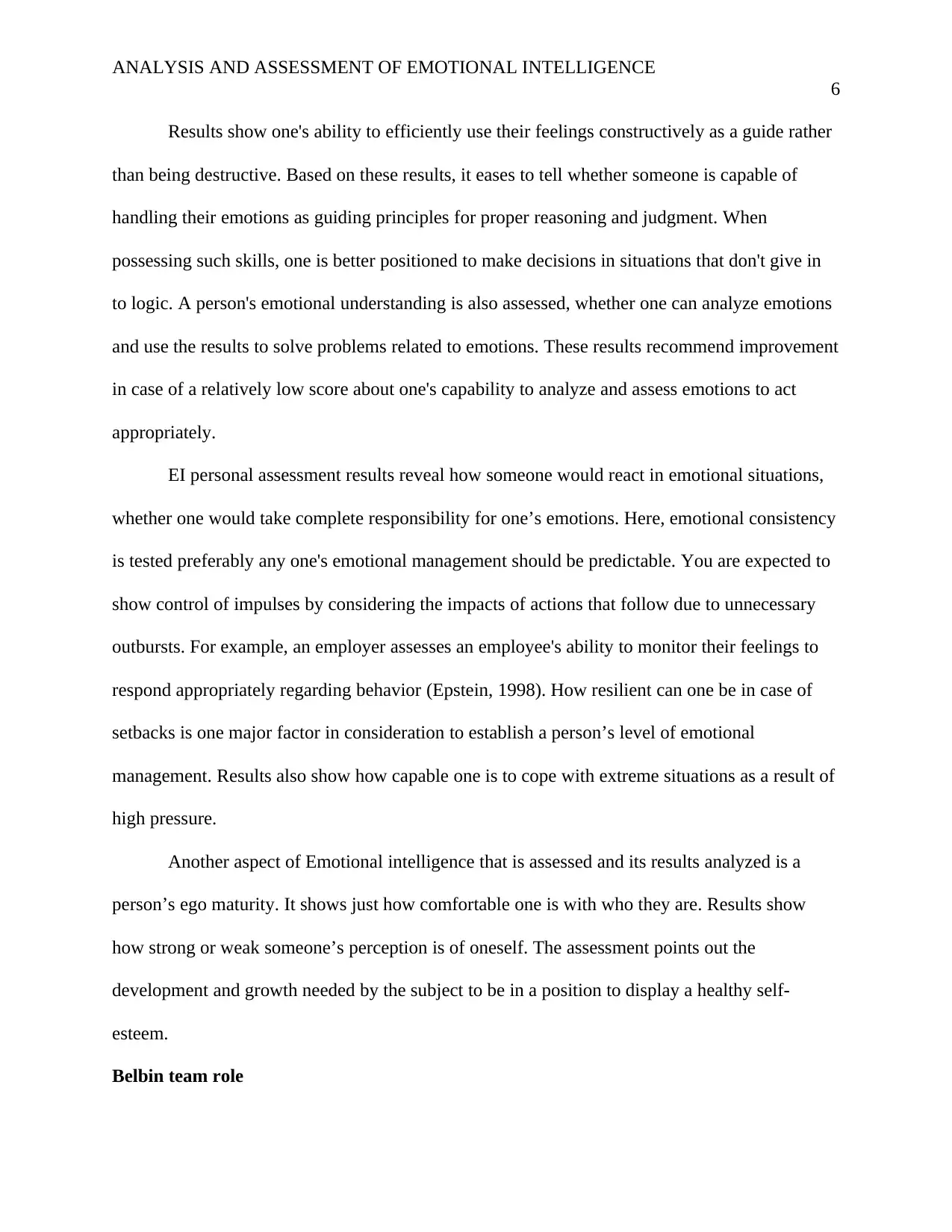
ANALYSIS AND ASSESSMENT OF EMOTIONAL INTELLIGENCE
6
Results show one's ability to efficiently use their feelings constructively as a guide rather
than being destructive. Based on these results, it eases to tell whether someone is capable of
handling their emotions as guiding principles for proper reasoning and judgment. When
possessing such skills, one is better positioned to make decisions in situations that don't give in
to logic. A person's emotional understanding is also assessed, whether one can analyze emotions
and use the results to solve problems related to emotions. These results recommend improvement
in case of a relatively low score about one's capability to analyze and assess emotions to act
appropriately.
EI personal assessment results reveal how someone would react in emotional situations,
whether one would take complete responsibility for one’s emotions. Here, emotional consistency
is tested preferably any one's emotional management should be predictable. You are expected to
show control of impulses by considering the impacts of actions that follow due to unnecessary
outbursts. For example, an employer assesses an employee's ability to monitor their feelings to
respond appropriately regarding behavior (Epstein, 1998). How resilient can one be in case of
setbacks is one major factor in consideration to establish a person’s level of emotional
management. Results also show how capable one is to cope with extreme situations as a result of
high pressure.
Another aspect of Emotional intelligence that is assessed and its results analyzed is a
person’s ego maturity. It shows just how comfortable one is with who they are. Results show
how strong or weak someone’s perception is of oneself. The assessment points out the
development and growth needed by the subject to be in a position to display a healthy self-
esteem.
Belbin team role
6
Results show one's ability to efficiently use their feelings constructively as a guide rather
than being destructive. Based on these results, it eases to tell whether someone is capable of
handling their emotions as guiding principles for proper reasoning and judgment. When
possessing such skills, one is better positioned to make decisions in situations that don't give in
to logic. A person's emotional understanding is also assessed, whether one can analyze emotions
and use the results to solve problems related to emotions. These results recommend improvement
in case of a relatively low score about one's capability to analyze and assess emotions to act
appropriately.
EI personal assessment results reveal how someone would react in emotional situations,
whether one would take complete responsibility for one’s emotions. Here, emotional consistency
is tested preferably any one's emotional management should be predictable. You are expected to
show control of impulses by considering the impacts of actions that follow due to unnecessary
outbursts. For example, an employer assesses an employee's ability to monitor their feelings to
respond appropriately regarding behavior (Epstein, 1998). How resilient can one be in case of
setbacks is one major factor in consideration to establish a person’s level of emotional
management. Results also show how capable one is to cope with extreme situations as a result of
high pressure.
Another aspect of Emotional intelligence that is assessed and its results analyzed is a
person’s ego maturity. It shows just how comfortable one is with who they are. Results show
how strong or weak someone’s perception is of oneself. The assessment points out the
development and growth needed by the subject to be in a position to display a healthy self-
esteem.
Belbin team role
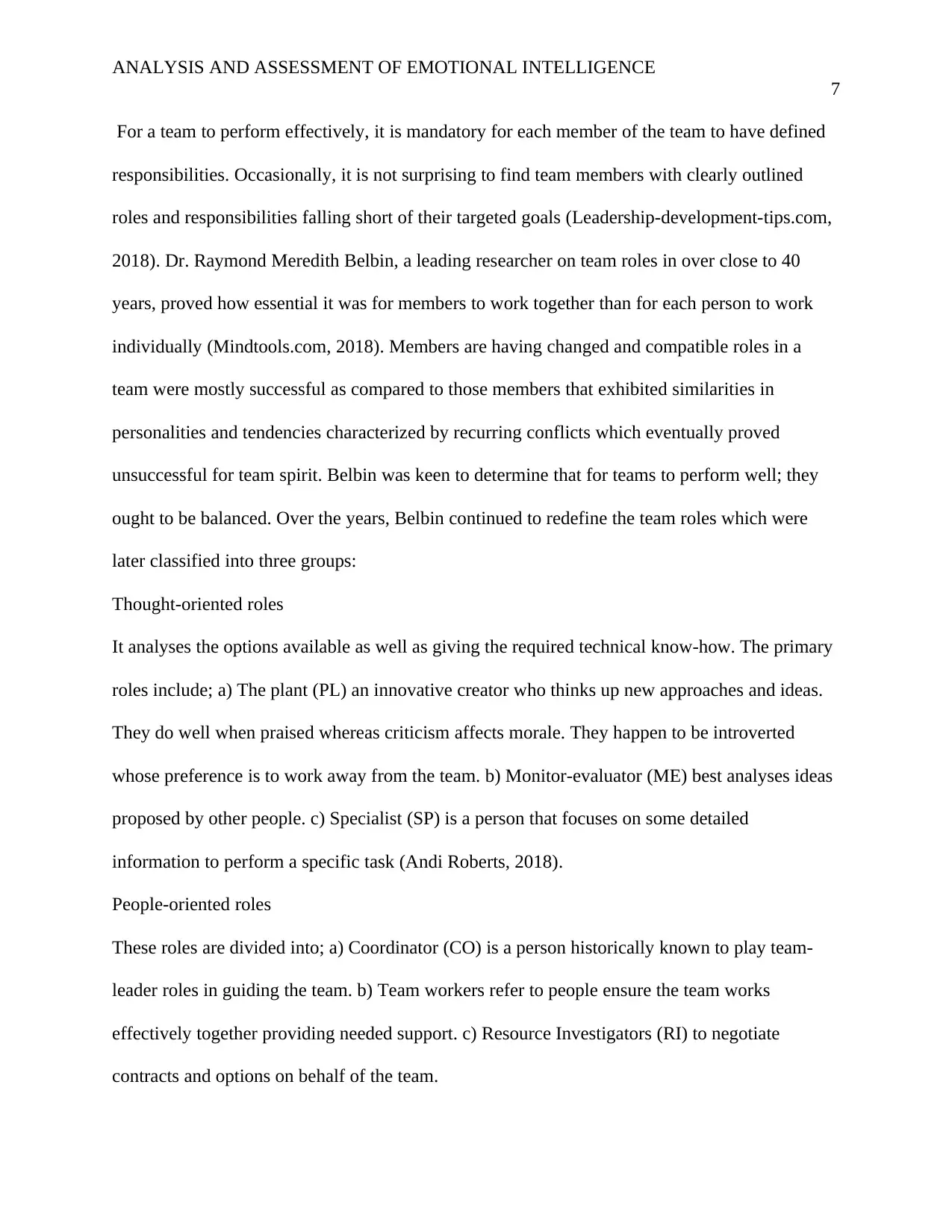
ANALYSIS AND ASSESSMENT OF EMOTIONAL INTELLIGENCE
7
For a team to perform effectively, it is mandatory for each member of the team to have defined
responsibilities. Occasionally, it is not surprising to find team members with clearly outlined
roles and responsibilities falling short of their targeted goals (Leadership-development-tips.com,
2018). Dr. Raymond Meredith Belbin, a leading researcher on team roles in over close to 40
years, proved how essential it was for members to work together than for each person to work
individually (Mindtools.com, 2018). Members are having changed and compatible roles in a
team were mostly successful as compared to those members that exhibited similarities in
personalities and tendencies characterized by recurring conflicts which eventually proved
unsuccessful for team spirit. Belbin was keen to determine that for teams to perform well; they
ought to be balanced. Over the years, Belbin continued to redefine the team roles which were
later classified into three groups:
Thought-oriented roles
It analyses the options available as well as giving the required technical know-how. The primary
roles include; a) The plant (PL) an innovative creator who thinks up new approaches and ideas.
They do well when praised whereas criticism affects morale. They happen to be introverted
whose preference is to work away from the team. b) Monitor-evaluator (ME) best analyses ideas
proposed by other people. c) Specialist (SP) is a person that focuses on some detailed
information to perform a specific task (Andi Roberts, 2018).
People-oriented roles
These roles are divided into; a) Coordinator (CO) is a person historically known to play team-
leader roles in guiding the team. b) Team workers refer to people ensure the team works
effectively together providing needed support. c) Resource Investigators (RI) to negotiate
contracts and options on behalf of the team.
7
For a team to perform effectively, it is mandatory for each member of the team to have defined
responsibilities. Occasionally, it is not surprising to find team members with clearly outlined
roles and responsibilities falling short of their targeted goals (Leadership-development-tips.com,
2018). Dr. Raymond Meredith Belbin, a leading researcher on team roles in over close to 40
years, proved how essential it was for members to work together than for each person to work
individually (Mindtools.com, 2018). Members are having changed and compatible roles in a
team were mostly successful as compared to those members that exhibited similarities in
personalities and tendencies characterized by recurring conflicts which eventually proved
unsuccessful for team spirit. Belbin was keen to determine that for teams to perform well; they
ought to be balanced. Over the years, Belbin continued to redefine the team roles which were
later classified into three groups:
Thought-oriented roles
It analyses the options available as well as giving the required technical know-how. The primary
roles include; a) The plant (PL) an innovative creator who thinks up new approaches and ideas.
They do well when praised whereas criticism affects morale. They happen to be introverted
whose preference is to work away from the team. b) Monitor-evaluator (ME) best analyses ideas
proposed by other people. c) Specialist (SP) is a person that focuses on some detailed
information to perform a specific task (Andi Roberts, 2018).
People-oriented roles
These roles are divided into; a) Coordinator (CO) is a person historically known to play team-
leader roles in guiding the team. b) Team workers refer to people ensure the team works
effectively together providing needed support. c) Resource Investigators (RI) to negotiate
contracts and options on behalf of the team.
Paraphrase This Document
Need a fresh take? Get an instant paraphrase of this document with our AI Paraphraser
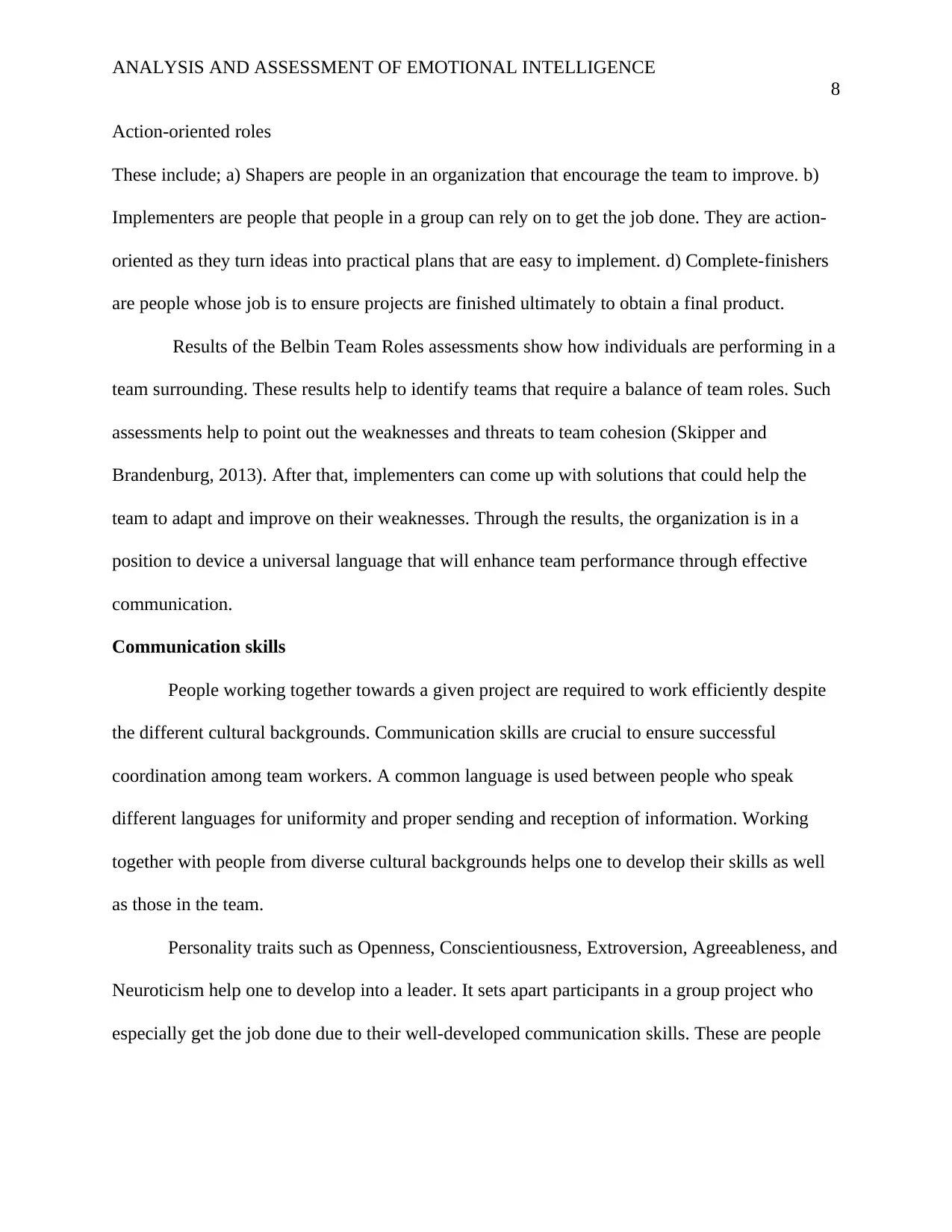
ANALYSIS AND ASSESSMENT OF EMOTIONAL INTELLIGENCE
8
Action-oriented roles
These include; a) Shapers are people in an organization that encourage the team to improve. b)
Implementers are people that people in a group can rely on to get the job done. They are action-
oriented as they turn ideas into practical plans that are easy to implement. d) Complete-finishers
are people whose job is to ensure projects are finished ultimately to obtain a final product.
Results of the Belbin Team Roles assessments show how individuals are performing in a
team surrounding. These results help to identify teams that require a balance of team roles. Such
assessments help to point out the weaknesses and threats to team cohesion (Skipper and
Brandenburg, 2013). After that, implementers can come up with solutions that could help the
team to adapt and improve on their weaknesses. Through the results, the organization is in a
position to device a universal language that will enhance team performance through effective
communication.
Communication skills
People working together towards a given project are required to work efficiently despite
the different cultural backgrounds. Communication skills are crucial to ensure successful
coordination among team workers. A common language is used between people who speak
different languages for uniformity and proper sending and reception of information. Working
together with people from diverse cultural backgrounds helps one to develop their skills as well
as those in the team.
Personality traits such as Openness, Conscientiousness, Extroversion, Agreeableness, and
Neuroticism help one to develop into a leader. It sets apart participants in a group project who
especially get the job done due to their well-developed communication skills. These are people
8
Action-oriented roles
These include; a) Shapers are people in an organization that encourage the team to improve. b)
Implementers are people that people in a group can rely on to get the job done. They are action-
oriented as they turn ideas into practical plans that are easy to implement. d) Complete-finishers
are people whose job is to ensure projects are finished ultimately to obtain a final product.
Results of the Belbin Team Roles assessments show how individuals are performing in a
team surrounding. These results help to identify teams that require a balance of team roles. Such
assessments help to point out the weaknesses and threats to team cohesion (Skipper and
Brandenburg, 2013). After that, implementers can come up with solutions that could help the
team to adapt and improve on their weaknesses. Through the results, the organization is in a
position to device a universal language that will enhance team performance through effective
communication.
Communication skills
People working together towards a given project are required to work efficiently despite
the different cultural backgrounds. Communication skills are crucial to ensure successful
coordination among team workers. A common language is used between people who speak
different languages for uniformity and proper sending and reception of information. Working
together with people from diverse cultural backgrounds helps one to develop their skills as well
as those in the team.
Personality traits such as Openness, Conscientiousness, Extroversion, Agreeableness, and
Neuroticism help one to develop into a leader. It sets apart participants in a group project who
especially get the job done due to their well-developed communication skills. These are people
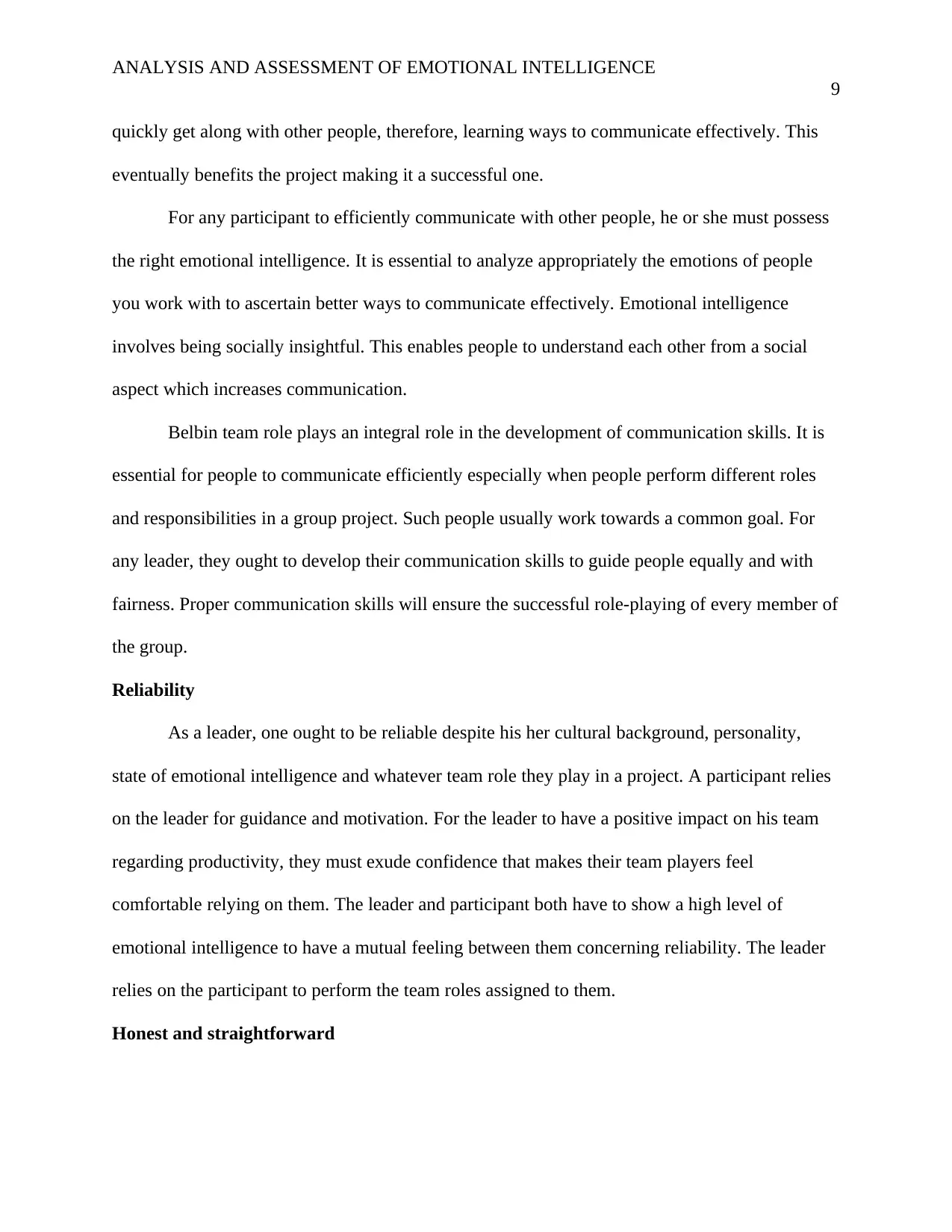
ANALYSIS AND ASSESSMENT OF EMOTIONAL INTELLIGENCE
9
quickly get along with other people, therefore, learning ways to communicate effectively. This
eventually benefits the project making it a successful one.
For any participant to efficiently communicate with other people, he or she must possess
the right emotional intelligence. It is essential to analyze appropriately the emotions of people
you work with to ascertain better ways to communicate effectively. Emotional intelligence
involves being socially insightful. This enables people to understand each other from a social
aspect which increases communication.
Belbin team role plays an integral role in the development of communication skills. It is
essential for people to communicate efficiently especially when people perform different roles
and responsibilities in a group project. Such people usually work towards a common goal. For
any leader, they ought to develop their communication skills to guide people equally and with
fairness. Proper communication skills will ensure the successful role-playing of every member of
the group.
Reliability
As a leader, one ought to be reliable despite his her cultural background, personality,
state of emotional intelligence and whatever team role they play in a project. A participant relies
on the leader for guidance and motivation. For the leader to have a positive impact on his team
regarding productivity, they must exude confidence that makes their team players feel
comfortable relying on them. The leader and participant both have to show a high level of
emotional intelligence to have a mutual feeling between them concerning reliability. The leader
relies on the participant to perform the team roles assigned to them.
Honest and straightforward
9
quickly get along with other people, therefore, learning ways to communicate effectively. This
eventually benefits the project making it a successful one.
For any participant to efficiently communicate with other people, he or she must possess
the right emotional intelligence. It is essential to analyze appropriately the emotions of people
you work with to ascertain better ways to communicate effectively. Emotional intelligence
involves being socially insightful. This enables people to understand each other from a social
aspect which increases communication.
Belbin team role plays an integral role in the development of communication skills. It is
essential for people to communicate efficiently especially when people perform different roles
and responsibilities in a group project. Such people usually work towards a common goal. For
any leader, they ought to develop their communication skills to guide people equally and with
fairness. Proper communication skills will ensure the successful role-playing of every member of
the group.
Reliability
As a leader, one ought to be reliable despite his her cultural background, personality,
state of emotional intelligence and whatever team role they play in a project. A participant relies
on the leader for guidance and motivation. For the leader to have a positive impact on his team
regarding productivity, they must exude confidence that makes their team players feel
comfortable relying on them. The leader and participant both have to show a high level of
emotional intelligence to have a mutual feeling between them concerning reliability. The leader
relies on the participant to perform the team roles assigned to them.
Honest and straightforward
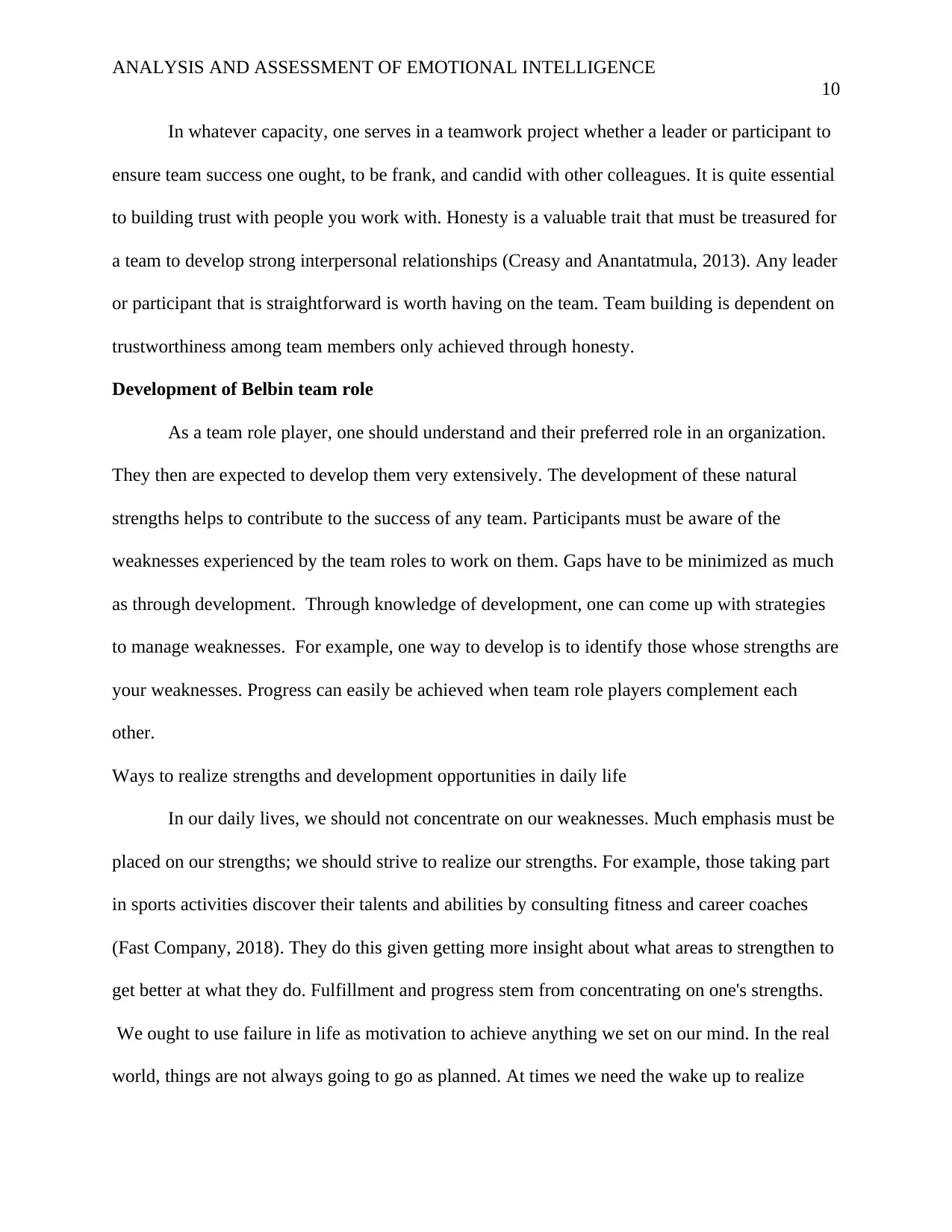
ANALYSIS AND ASSESSMENT OF EMOTIONAL INTELLIGENCE
10
In whatever capacity, one serves in a teamwork project whether a leader or participant to
ensure team success one ought, to be frank, and candid with other colleagues. It is quite essential
to building trust with people you work with. Honesty is a valuable trait that must be treasured for
a team to develop strong interpersonal relationships (Creasy and Anantatmula, 2013). Any leader
or participant that is straightforward is worth having on the team. Team building is dependent on
trustworthiness among team members only achieved through honesty.
Development of Belbin team role
As a team role player, one should understand and their preferred role in an organization.
They then are expected to develop them very extensively. The development of these natural
strengths helps to contribute to the success of any team. Participants must be aware of the
weaknesses experienced by the team roles to work on them. Gaps have to be minimized as much
as through development. Through knowledge of development, one can come up with strategies
to manage weaknesses. For example, one way to develop is to identify those whose strengths are
your weaknesses. Progress can easily be achieved when team role players complement each
other.
Ways to realize strengths and development opportunities in daily life
In our daily lives, we should not concentrate on our weaknesses. Much emphasis must be
placed on our strengths; we should strive to realize our strengths. For example, those taking part
in sports activities discover their talents and abilities by consulting fitness and career coaches
(Fast Company, 2018). They do this given getting more insight about what areas to strengthen to
get better at what they do. Fulfillment and progress stem from concentrating on one's strengths.
We ought to use failure in life as motivation to achieve anything we set on our mind. In the real
world, things are not always going to go as planned. At times we need the wake up to realize
10
In whatever capacity, one serves in a teamwork project whether a leader or participant to
ensure team success one ought, to be frank, and candid with other colleagues. It is quite essential
to building trust with people you work with. Honesty is a valuable trait that must be treasured for
a team to develop strong interpersonal relationships (Creasy and Anantatmula, 2013). Any leader
or participant that is straightforward is worth having on the team. Team building is dependent on
trustworthiness among team members only achieved through honesty.
Development of Belbin team role
As a team role player, one should understand and their preferred role in an organization.
They then are expected to develop them very extensively. The development of these natural
strengths helps to contribute to the success of any team. Participants must be aware of the
weaknesses experienced by the team roles to work on them. Gaps have to be minimized as much
as through development. Through knowledge of development, one can come up with strategies
to manage weaknesses. For example, one way to develop is to identify those whose strengths are
your weaknesses. Progress can easily be achieved when team role players complement each
other.
Ways to realize strengths and development opportunities in daily life
In our daily lives, we should not concentrate on our weaknesses. Much emphasis must be
placed on our strengths; we should strive to realize our strengths. For example, those taking part
in sports activities discover their talents and abilities by consulting fitness and career coaches
(Fast Company, 2018). They do this given getting more insight about what areas to strengthen to
get better at what they do. Fulfillment and progress stem from concentrating on one's strengths.
We ought to use failure in life as motivation to achieve anything we set on our mind. In the real
world, things are not always going to go as planned. At times we need the wake up to realize
Secure Best Marks with AI Grader
Need help grading? Try our AI Grader for instant feedback on your assignments.
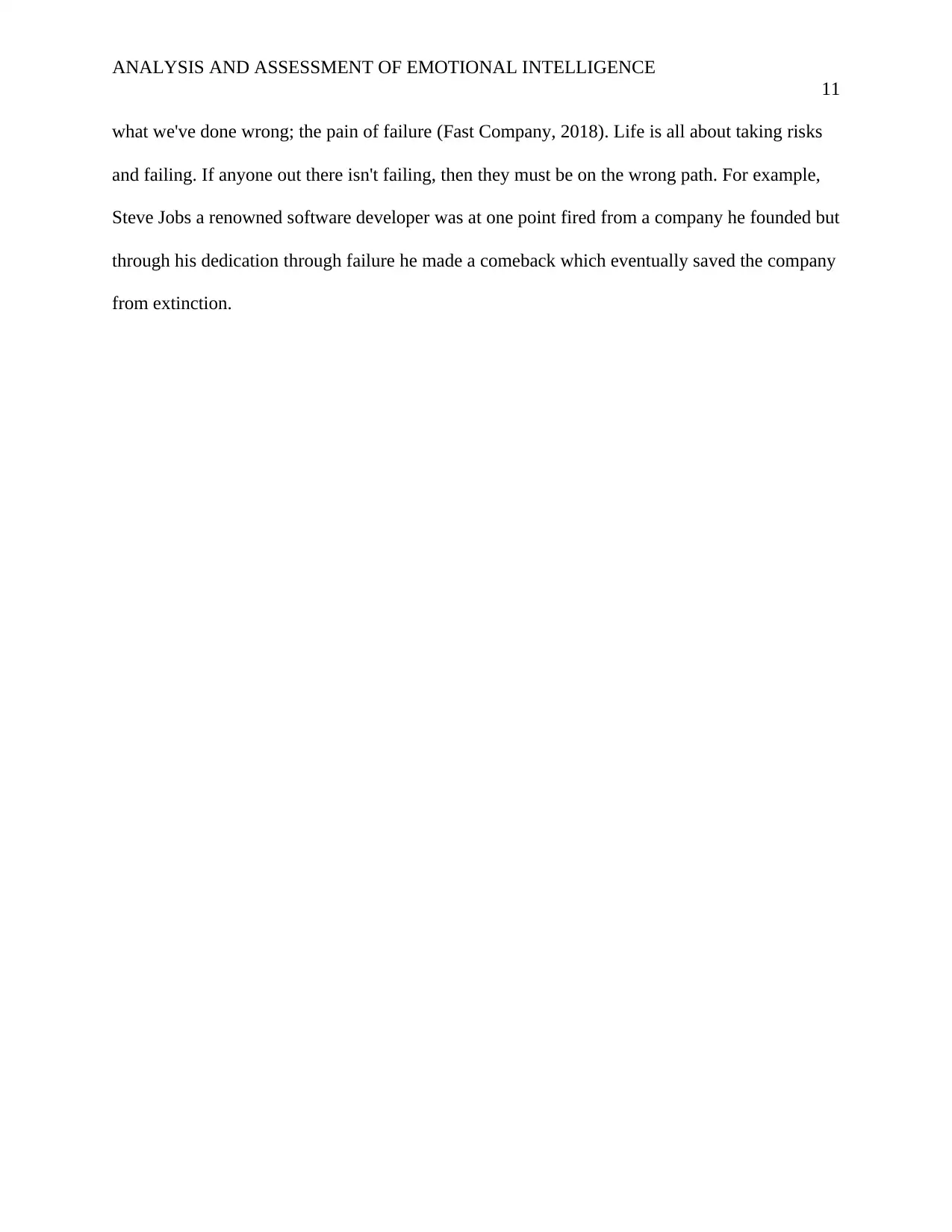
ANALYSIS AND ASSESSMENT OF EMOTIONAL INTELLIGENCE
11
what we've done wrong; the pain of failure (Fast Company, 2018). Life is all about taking risks
and failing. If anyone out there isn't failing, then they must be on the wrong path. For example,
Steve Jobs a renowned software developer was at one point fired from a company he founded but
through his dedication through failure he made a comeback which eventually saved the company
from extinction.
11
what we've done wrong; the pain of failure (Fast Company, 2018). Life is all about taking risks
and failing. If anyone out there isn't failing, then they must be on the wrong path. For example,
Steve Jobs a renowned software developer was at one point fired from a company he founded but
through his dedication through failure he made a comeback which eventually saved the company
from extinction.
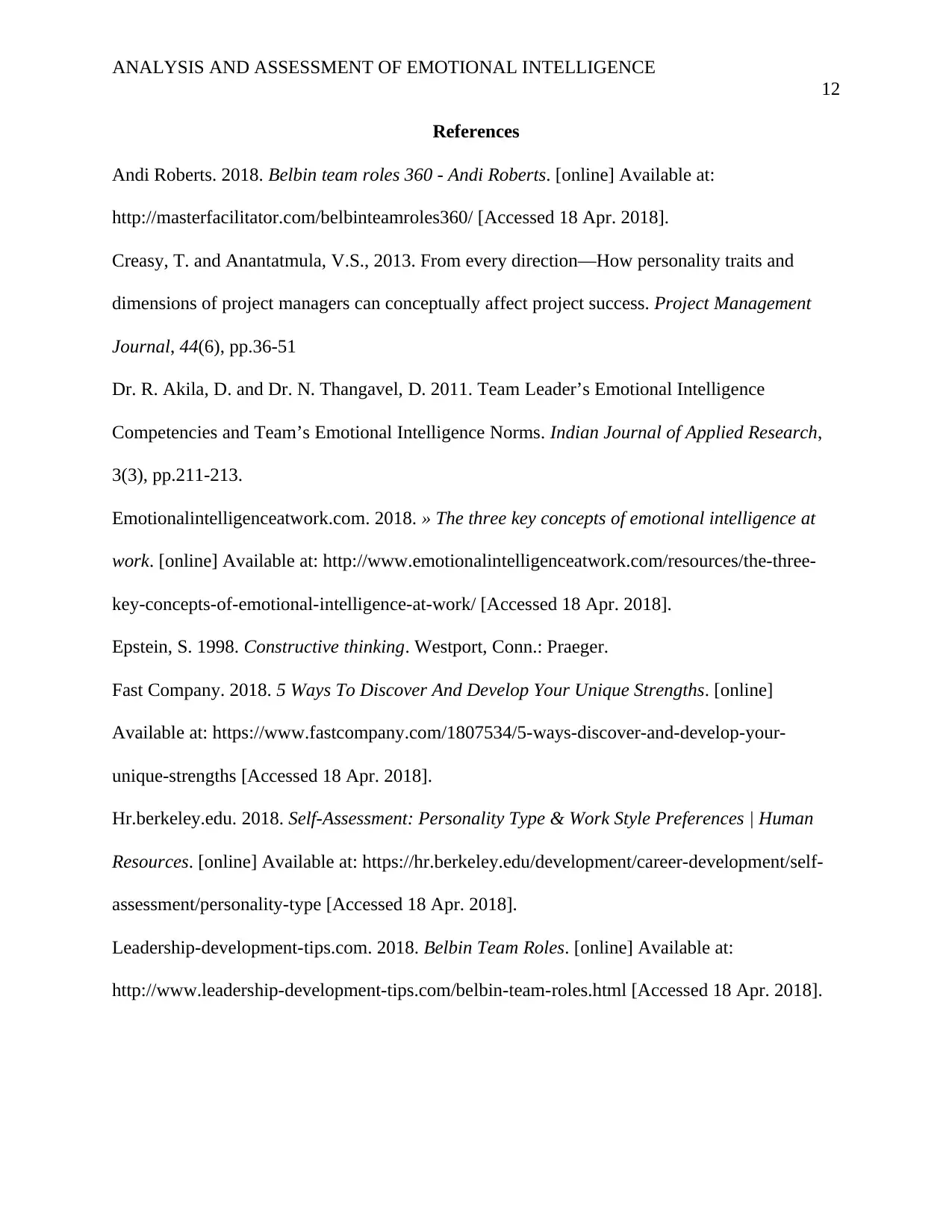
ANALYSIS AND ASSESSMENT OF EMOTIONAL INTELLIGENCE
12
References
Andi Roberts. 2018. Belbin team roles 360 - Andi Roberts. [online] Available at:
http://masterfacilitator.com/belbinteamroles360/ [Accessed 18 Apr. 2018].
Creasy, T. and Anantatmula, V.S., 2013. From every direction—How personality traits and
dimensions of project managers can conceptually affect project success. Project Management
Journal, 44(6), pp.36-51
Dr. R. Akila, D. and Dr. N. Thangavel, D. 2011. Team Leader’s Emotional Intelligence
Competencies and Team’s Emotional Intelligence Norms. Indian Journal of Applied Research,
3(3), pp.211-213.
Emotionalintelligenceatwork.com. 2018. » The three key concepts of emotional intelligence at
work. [online] Available at: http://www.emotionalintelligenceatwork.com/resources/the-three-
key-concepts-of-emotional-intelligence-at-work/ [Accessed 18 Apr. 2018].
Epstein, S. 1998. Constructive thinking. Westport, Conn.: Praeger.
Fast Company. 2018. 5 Ways To Discover And Develop Your Unique Strengths. [online]
Available at: https://www.fastcompany.com/1807534/5-ways-discover-and-develop-your-
unique-strengths [Accessed 18 Apr. 2018].
Hr.berkeley.edu. 2018. Self-Assessment: Personality Type & Work Style Preferences | Human
Resources. [online] Available at: https://hr.berkeley.edu/development/career-development/self-
assessment/personality-type [Accessed 18 Apr. 2018].
Leadership-development-tips.com. 2018. Belbin Team Roles. [online] Available at:
http://www.leadership-development-tips.com/belbin-team-roles.html [Accessed 18 Apr. 2018].
12
References
Andi Roberts. 2018. Belbin team roles 360 - Andi Roberts. [online] Available at:
http://masterfacilitator.com/belbinteamroles360/ [Accessed 18 Apr. 2018].
Creasy, T. and Anantatmula, V.S., 2013. From every direction—How personality traits and
dimensions of project managers can conceptually affect project success. Project Management
Journal, 44(6), pp.36-51
Dr. R. Akila, D. and Dr. N. Thangavel, D. 2011. Team Leader’s Emotional Intelligence
Competencies and Team’s Emotional Intelligence Norms. Indian Journal of Applied Research,
3(3), pp.211-213.
Emotionalintelligenceatwork.com. 2018. » The three key concepts of emotional intelligence at
work. [online] Available at: http://www.emotionalintelligenceatwork.com/resources/the-three-
key-concepts-of-emotional-intelligence-at-work/ [Accessed 18 Apr. 2018].
Epstein, S. 1998. Constructive thinking. Westport, Conn.: Praeger.
Fast Company. 2018. 5 Ways To Discover And Develop Your Unique Strengths. [online]
Available at: https://www.fastcompany.com/1807534/5-ways-discover-and-develop-your-
unique-strengths [Accessed 18 Apr. 2018].
Hr.berkeley.edu. 2018. Self-Assessment: Personality Type & Work Style Preferences | Human
Resources. [online] Available at: https://hr.berkeley.edu/development/career-development/self-
assessment/personality-type [Accessed 18 Apr. 2018].
Leadership-development-tips.com. 2018. Belbin Team Roles. [online] Available at:
http://www.leadership-development-tips.com/belbin-team-roles.html [Accessed 18 Apr. 2018].
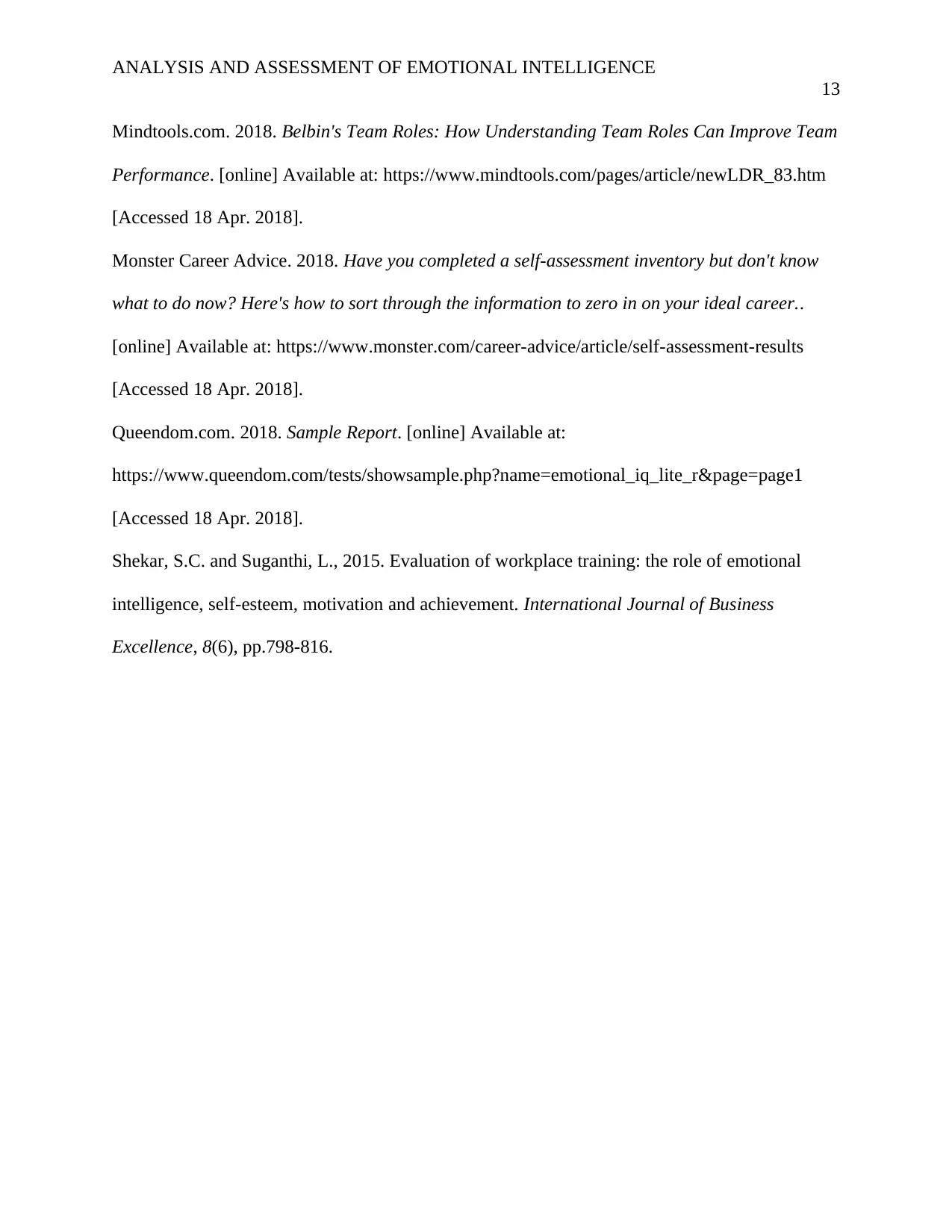
ANALYSIS AND ASSESSMENT OF EMOTIONAL INTELLIGENCE
13
Mindtools.com. 2018. Belbin's Team Roles: How Understanding Team Roles Can Improve Team
Performance. [online] Available at: https://www.mindtools.com/pages/article/newLDR_83.htm
[Accessed 18 Apr. 2018].
Monster Career Advice. 2018. Have you completed a self-assessment inventory but don't know
what to do now? Here's how to sort through the information to zero in on your ideal career..
[online] Available at: https://www.monster.com/career-advice/article/self-assessment-results
[Accessed 18 Apr. 2018].
Queendom.com. 2018. Sample Report. [online] Available at:
https://www.queendom.com/tests/showsample.php?name=emotional_iq_lite_r&page=page1
[Accessed 18 Apr. 2018].
Shekar, S.C. and Suganthi, L., 2015. Evaluation of workplace training: the role of emotional
intelligence, self-esteem, motivation and achievement. International Journal of Business
Excellence, 8(6), pp.798-816.
13
Mindtools.com. 2018. Belbin's Team Roles: How Understanding Team Roles Can Improve Team
Performance. [online] Available at: https://www.mindtools.com/pages/article/newLDR_83.htm
[Accessed 18 Apr. 2018].
Monster Career Advice. 2018. Have you completed a self-assessment inventory but don't know
what to do now? Here's how to sort through the information to zero in on your ideal career..
[online] Available at: https://www.monster.com/career-advice/article/self-assessment-results
[Accessed 18 Apr. 2018].
Queendom.com. 2018. Sample Report. [online] Available at:
https://www.queendom.com/tests/showsample.php?name=emotional_iq_lite_r&page=page1
[Accessed 18 Apr. 2018].
Shekar, S.C. and Suganthi, L., 2015. Evaluation of workplace training: the role of emotional
intelligence, self-esteem, motivation and achievement. International Journal of Business
Excellence, 8(6), pp.798-816.
1 out of 13
Related Documents
Your All-in-One AI-Powered Toolkit for Academic Success.
+13062052269
info@desklib.com
Available 24*7 on WhatsApp / Email
![[object Object]](/_next/static/media/star-bottom.7253800d.svg)
Unlock your academic potential
© 2024 | Zucol Services PVT LTD | All rights reserved.




